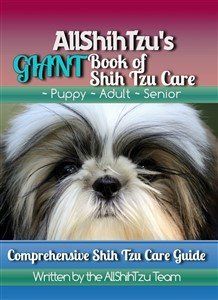When a Shih Tzu is Itchy
Some Quick Facts About Itching
- Itching may be acute (comes on quick and is temporary) or chronic (lasts a long time)
- It may be caused by a wide range of things. The top causes of itchiness with Shih Tzu dogs are contact irritants (including reaction to coat products), skin yeast infection, allergies, acral lick dermatitis, skin bacterial infection, fleas and other skin parasites, dry skin and dandruff.
- Itching may be localized (in one specific area like the paws or the underarms) or it may be a full-body issue
- The type of treatment will depend on what is causing the itching (including unknown triggers), how intense the problem is, and if there are other symptoms seen alongside the itching.
Please note: AllShihTzu is reader-supported, and some of the product suggestions on this page are affiliate links. As an Amazon Associate we earn from qualifying purchases. This is at no extra cost to you and helps keep this site running.
Sections:
Itching, and its many causes and treatments, is a complex issue. If you are not sure what your Shih Tzu is experiencing, read through this article. If you do have an idea, below are the sections on this page:
Acute, Localized Itching (for example, from a bug bite)
Itching Just on the Paws: Includes irritants, allergies, yeast infections and other/unknown
Full Body Itching: Includes reactions to shampoos, fleas, allergies, parasites or infections, yeast infection, dry skin, dandruff and cause unknown.
Treatments for Itching: Includes all methods of relief: anti-itch sprays, anti-itch cream, anti-itch shampoo, and medicated topical treatments.
Signs that a Shih Tzu is Itchy
Acute Localized Itching
Itching Just on the Paws
#1 Contact Irritants.
#2 Skin Yeast Infection.
#3 Allergies.
#4 Other Causes.
Full Body Itching
#1 Reaction to Subpar Shampoo.
#2 Fleas.
#3 Allergies.
#4 Skin Parasites or Infections.
#5 Skin Yeast Infection.
What to do: Minor to moderate cases may be successfully treated at home using an anti-fungal shampoo and/or topical treatment, see ‘Treatments for Itching: Skin Yeast Infection Topical Treatments’, ahead. Though, chronic or reoccurring cases should be investigated by the veterinarian. And, stubborn cases that do not respond to at-home treatment methods often require prescribed oral and topical anti-fungals.
#6 Dry Skin.
#7 Dandruff.
- Supplements containing omega-3 fatty acids (like fish oil). One we recommend is Zesty Paws Omega 3 Alaskan Fish Oil Treats which are delicious bite-sized chews.
- Shampoos or sprays specifically formulated for anti-seborrheic treatment. One that we recommend is Douxo Shampoo for Seborrhea in Dogs which works by normalizing sebum production while hydrating the skin. This is pH balanced, hypoallergenic and is sulfate and phthalate-free.
#8 Cause Unknown.
Ears are Itchy
Genital Area is Itchy
Treatments for Itching
#1 Anti-itch Sprays
#2 Anti-itch Creams
For widespread itching, a cream like ResQ Organics Pet Skin Treatment can be effective, especially for dry cracks on paws or noses, thanks to its luxurious, restorative ingredients like organic aloe vera, Manuka honey, and coconut oil. However, if your Shih Tzu is in discomfort, not just itching, consider a medicated spray instead (see previous step). This cream is also great for uncertain causes of itching due to its wide-ranging ingredients.
#3 Anti-Itch Shampoo
Shampoos to help with itching are great to treat a Shih Tzu’s entire body since it provides excellent coverage (no crevice will be missed) and it’s a chance to really soak a dog in a treatment product. In addition, a specialty anti-itch shampoo is also a good idea if you want to do foot soak for itchy paws.
There are two shampoos we recommend. If you know that your Shih Tzu's main skin issue is dry skin, we like Earthbath Oatmeal and Aloe Shampoo (and it is, in fact, the shampoo we recommend is always used, since this breed is so prone to dry skin).
And if your Shih Tzu has a rash, irritated skin, red patches, hot spot or any other related issues, we recommend Earthbath's Tea Tree Oil & Aloe Vera Shampoo.
Note 1: No matter which shampoo you use, these recommended ones or others, be sure to follow with a wash-out conditioner. The above-referenced Earthbath has a fantastic Oatmeal & Aloe Vanilla conditioner that can be used after any shampoo.
Note 2: Though it is generally recommended to give a Shih Tzu baths once every 3 weeks, if you are using a specialty product like this to treat itching, you can soak your puppy or dog once or twice a week. Just be sure to follow up with a good wash-out conditioner and pat the coat dry (no rubbing).
There are wipes like Smiling Paws Pet Antibacterial and Anti-fungal Wipes which have both ketoconazole and chlorhexidine and are great for the tummy, paws and other spot treatments.
And there are shampoos like Veterinary Formula's Clinical Care Antiseptic and Anti-fungal Medicated Shampoo, which are used to treat full-body problems. This one is It is medicated with benzethonium chloride to reduce any bacterial growth and ketoconazole to treat yeast infections. It also contains aloe to soothe and has no parbens, detergent or dyes.
Generally, a dog is lathered up and then soaked in this once a day for 7 days, then twice per week for two weeks. Since treating the whole body with medication can be quite a bit for a small dog like the Shih Tzu, you can mix this with your little guy or gal's regular shampoo (50/50) if you find them to tolerable it better that way.
With any sort of anti-fungal topical treatment, if results are not seen in 2 to 3 weeks, this is your sign that a stronger, veterinary prescribed oral and/or topical medication may be needed.
Final Thoughts
Itching can be frustrating, for both you and your Shih Tzu. But, understanding the type, location and possible causes is the first step toward real relief. Whether it's localized irritation or full-body discomfort, many issues can be managed with the right care, consistency, and sometimes a little detective work. Your Shih Tzu will thank you with every peaceful nap and happy tail wag.
More Articles for You:
Mild Munchies for Shih Tzu with Sensitive Stomachs - These limited ingredient treats are a smart choice for pups with delicate bellies. Each is easy on digestion but still packed with tail-wagging taste.
The Ultimate Shih Tzu Toy Collection - This all-in-one toy guide covers every type of play, from teething relief and solo enrichment to fetch games and comfort toys for separation anxiety. It's everything you need to make playtime more rewarding.
Helpful Gadgets to Simplify Life with a Shih Tzu - A few smart tools can make a big difference. These fun little devices, tools and doodads make everyday life easier, and way more fun, for both you and your Shih Tzu.
Let's stay connected:

